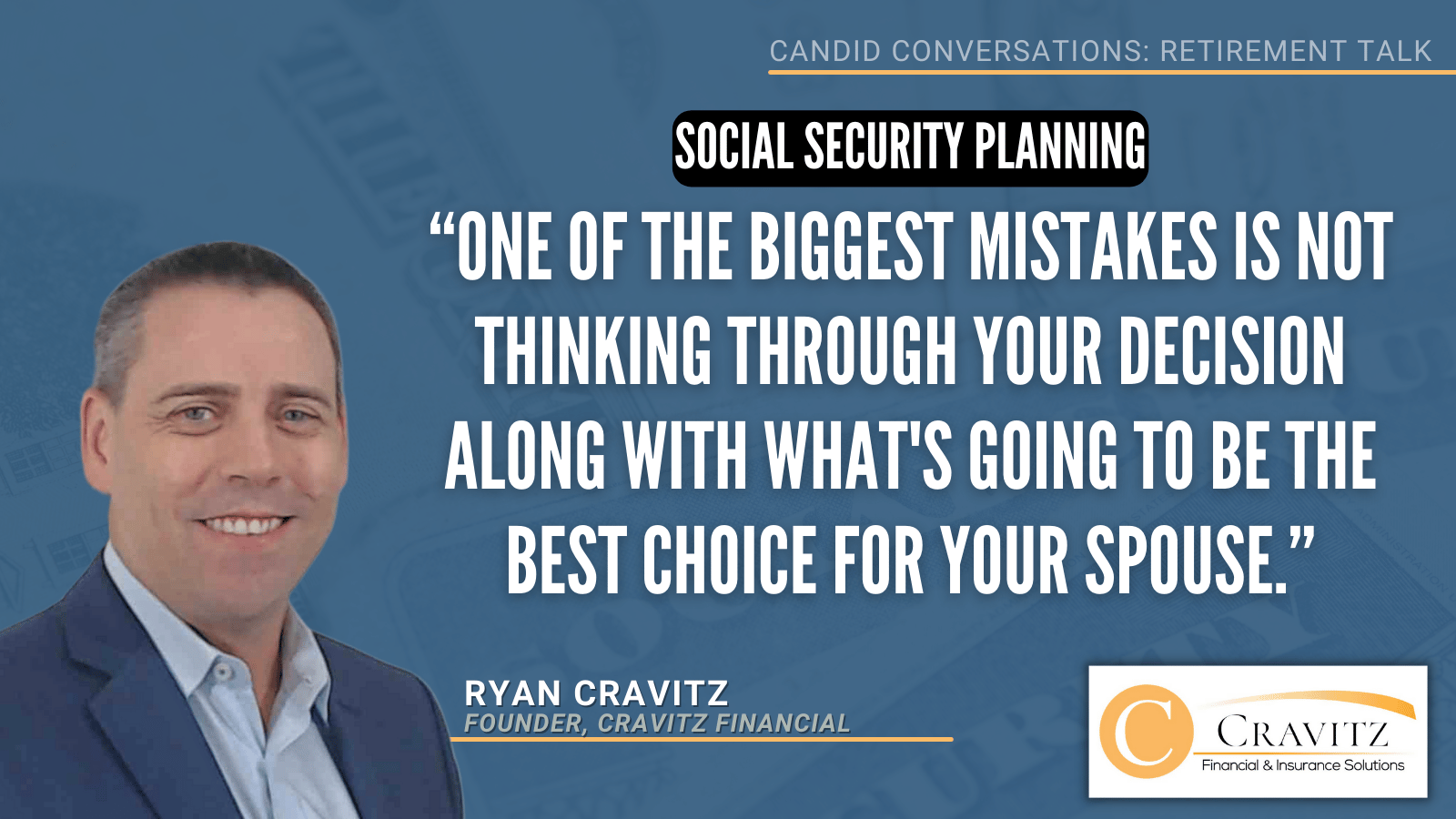One of the biggest questions that we get about Social Security is when should I take my benefits? A lot of people want to claim them as soon as they can for multiple reasons, but would you be better off delaying your benefits up to age 70?
Social Security plays a huge role in income planning for retirees so it’s an area of retirement that needs your full attention. As you’ll hear in this video, there are many factors that go into answering this question, which means there isn’t a blanket answer that will work for everyone.
Join us as we explore five compelling reasons why you might want to consider postponing your Social Security claims, from maximizing survivor benefits to enhancing long-term financial stability.
Here’s what we discuss in this episode:
0:00 – Intro
1:25 – Survivor benefits
2:48 – Increase your monthly benefit
4:49 – Long-term stability
6:18 – Tax advantages
7:56 – Spousal benefits
10:05 – How far out should you plan?


News You Can Use
Get actionable financial advice delivered to your inbox a few times a month.
Full Transcript:
Ben (00:00):
Question about Social Security. When do you start your benefits? Do you take 'em as early as possible? Do you delay? Where does it fall in between that scale? Well, today we're going to talk about some reasons why you might actually delay your Social Security benefits. We've got a few different reasons. Ryan Cravitz will break it all down for us. Coming up next.
Announcer (00:17):
This is Candid Conversations Retirement Talk with Ryan Cravitz of Cravitz Financial & Insurance Solutions.
Ben (00:25):
Well, hello and welcome in. This is Candid Conversations Retirement Talk with Ryan Cravitz. I'm Ben George. He is Ryan Cravitz at Cravitz Financial in Orange, California, but serving clients nationwide, find him at CravitzFinancial.com. Social Security, a big topic always for retirees, right, Ryan? Trying to figure out when is the best time for me to claim my benefit? And believe it or not, there's absolutely a strategy to it, right?
Ryan (00:48):
Absolutely. And you have to decide what you're going to do there, depending, I mean it all depends on whether you're single or married or if you're divorced and maybe entitled to a benefit there or if you're widowed or it all depends on what your situation is. It can get complicated for sure.
Ben (01:07):
Yeah, we're going to break it down today. I have five different reasons why you might delay, so if you enjoy what you hear, if you're just joining us, whatever it is, please subscribe if you haven't already. We appreciate the support. It helps grow the channel and we want to continue providing this information and education with no cost. Just want to try to help you out as you try to learn more and prepare yourself for retirement. Ryan, first up, I want to talk about survivor benefits. Tell me about this a little bit more and why this is could be a reason potentially for delay.
Ryan (01:34):
Yeah, so this one's interesting because Ben, one of the biggest mistakes that I see is when somebody's trying to decide when to take their Social Security benefits is oftentimes it's the husband, not always, but oftentimes it is, and he's the higher breadwinner. So he has the higher benefit and then his wife is perhaps a couple years younger than him. Well, he says, Hey, I turned 62, I'm going to go ahead and take my Social Security benefits. I want to go ahead and get what's mine because I don't know how long I'm going to live. And then meanwhile, his wife is again, maybe a couple of years younger, maybe in pretty good health. Well, when he ends up passing away, she'll end up getting a much reduced survivor benefit there for the rest of her life. So that's one reason to delay. You always need to consider your decision if you're married in the context of your overall plan and the life expectancy of both of you and when you're going to draw down from different assets and when and how Social Security is going to be incorporated into those decisions.
Ben (02:46):
Alright, so that's the first one. Now, the biggest one I think for a lot of people when they think about waiting is just to get more every month, right? To increase that monthly check. That's a big reason why you delay
Ryan (02:57):
It is yeah, I mean you can take your Social Security at 62, right... That's the earliest age you can or you can delay and you can take it all the way at age 70. Now there's no point in delaying past 70, you're not going to earn any of these delayed retirement credits by waiting. And so the decision comes up, should I take it at 62, I'll get more checks albeit for a smaller amount over the course of my lifetime or should I delay? And then obviously then you're going to get less checks, albeit for a higher amount. The question then is, what should I do? What's going to give me the best bang for my buck there? And so there's a lot of factors that you need to consider, but one of them that comes up quite often is once you turn 62, if you're still working, you're going to be subject to the earnings test.
(03:55):
And so if you make over a certain limit and they adjust this limit every year, they're going to start withholding the Social Security benefits that you're receiving. Now, it's not like those benefits are completely gone. What happens is once you get to your full retirement age, they'll adjust the benefit that you're receiving to account for that you had lost those benefits before or that they were withheld and then you'll get a higher benefit there going forward into the future. So that's just one thing you have to consider on that side. Once you get to your full retirement age, you can work, you make as much money as you want, you won't be subject to that earnings test. So in that situation, it might make sense to wait until full retirement age or even beyond.
Ben (04:42):
Okay? So not the only reason why you'd want to delay, but one reason potentially is because you could have a bigger check coming in every month. All right. What about long-term stability? How can waiting and delaying provide that stability? I know that's something a lot of people are looking for in retirement.
Ryan (04:57):
Yeah, the first thing is because Social Security will provide that monthly income stream for the rest of your life, and it has historically provided an increasing income stream because in almost every year there's been some sort of COLA cost of living adjustment. There were a couple of years there. I remember recently, I think it was 2010 and 11, right around there where there were no colas, but that's when interest rates and inflation was much lower than it is typically. But having that by delaying your benefit if you can, and not everyone can afford to do so, but if you can, getting those costs of living adjustments on that higher amount can end up putting you in a better position there going forward. For sure.
Ben (05:51):
Yeah, it's interesting you mentioned the cost of living. It was '09 and in 2010, even as recent as 2015, there was a 0% adjustment. I think we've just been used to it these last few years, almost 6% in 2021, almost 9% in 2022, and then back down to a modest 3%, which was still higher than it really was for the last decade almost.
Ryan (06:10):
Yeah, no doubt about it for sure.
Ben (06:13):
It's crazy. So that is part of the factor at all is that stability. It's a big piece of the puzzle. Now, I know when you're looking at income and you're trying to figure out the plan for retirement and trying to crunch all the numbers and make the equation work, you got to factor in taxes. Ryan, always, taxes are a part of this conversation. So how can delaying maybe make it more tax efficient for you?
Ryan (06:34):
The nice thing about Social Security is its tax advantages. I say because if your only source of income is Social Security, then you won't have to pay any taxes, at least not on the federal level. It's just other income that can cause your Social Security to become taxable. And even if you make, let's say $10 million a year, you'll still never pay taxes on more than 85% of your Social Security benefits. 15% will always be tax free at the federal level. So it is tax advantaged in that sense, and it is nice having that income. If you can combine that with maybe taking some money from an IRA or a 401(k), which will be subject to ordinary income, maybe taking some money from a Roth IRA, which you would be able to access in the future tax free, then you may be able to reduce the amount of total taxes that you'll have to pay. You'll have less money that's going to cause your Social Security benefits to become taxable. So that can help put you in a much better position. That's one of the reasons to consider contributing to a Roth account or consider doing Roth conversions when you have the opportunity to do that.
Ben (07:55):
Alright, so tax is always keeping that in mind. The last point here on why you might delay your Social Security benefits is just that consideration of spousal benefits, right? One more kind of piece of the puzzle.
Ryan (08:06):
And this goes in there again, kind of like I was talking about earlier. Again, one of the biggest mistakes there is not thinking through your decision along with what's going to be the best choice also for your spouse. And if you're married, the decision on when you take your benefit and your spouse takes their benefit, you could take your benefits at very different times. For instance, oftentimes it can make sense for the higher breadwinner to delay their benefit for a longer period of time, maybe even until age 70. Now, again, it doesn't always make sense within your plan. It depends upon your other income and all of that. But oftentimes it can make sense if possible, to have the higher breadwinner delay taking benefits until 70 and the lower income earner or the spouse with a lower benefit to take their benefit earlier. Because remember, when one spouse passes away, you're going to lose that Social Security check and the survivor has to files a single person. So this can help to put that surviving spouse in a better position. And the other nice thing too about having that lower income earning spouse taking that benefit earlier is that that does get some checks coming into the household sooner because if both spouses were to delay and then one spouse were to pass, you might be giving up some money there that you could have gotten otherwise. So there's a lot of factors to consider, including your health and everything else for sure.
Ben (09:46):
All right, so when you come up on that Social Security decision, these are a few things to be thinking about in terms of why you would delay. Obviously you might be better off taking it as soon as possible. These are some of the things you discussed with a financial professional like Ryan Cravitz, Ryan, for anyone that's approaching retirement and really kind of thinking hard about this Social Security piece of the puzzle, at what age do you truly start kind of dialing in this conversation? Is it a year before? Is it a couple years before? How far out do you get ahead of this?
Ryan (10:12):
At least a couple years before planning for retirement? So you're starting to think through how you're going to structure your overall income plan, because again, Social Security is just one piece of the puzzle. You're going to have Social Security and hopefully you're going to have other sources of income as well. So at least a couple years out really starting to plan for how you're going to put together the pieces to provide you with the income that you want.
Ben (10:38):
All right. Any questions that you might have? 714-462-9155 or log on CravitzFinancial.com. Is this a part of that initial conversation you have Ryan or with people Ryan, or is this just the ongoing kind of, once you get into it with them, you dive more into Social security?
Ryan (10:56):
Social Security is actually one of the things we look at at the front end or towards the front end because for a lot of people it is the foundation of a sound retirement plan. A lot of people find it shocking to realize just how much they could actually receive over the course of their lifetime from Social Security. So it could be a million, could be 2 million depending if you're single married, what your overall earnings history is and all of that. And again, it's a tax advantaged source of income. So it's important to understand how it works, what other benefits you may be entitled to as well. Right? We don't talk about that here, but any survivor benefits, prior marriages, divorce benefits, anything else? So all this needs to be considered for sure.
Ben (11:46):
Yeah, I don't take this decision for granted. It is an important one. You can learn more about Social Security through other videos here on this YouTube channel that Ryan's already created. We'll have more coming down the road too. Please hit subscribe. If you've enjoyed this video, if it's been a help to you, we'd appreciate your support there by hitting subscribe and also any questions, any feedback you can always get in touch with Ryan as well. All the contact info is in the show notes for you. Ryan, thanks for this. I know it's important, Social Security, a big piece of income for a lot of people, and I know that this is a conversation you're going to have down the road with a lot of folks, so hopefully this helps 'em out today.
Ryan (12:17):
Absolutely. Good to see you, Ben.
